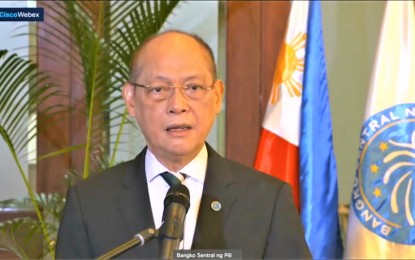
BSP Governor Benjamin Diokno (file photo)
MANILA – Bangko Sentral ng Pilipinas (BSP) Governor Benjamin Diokno said Thursday the national government does not need another bridge financing, citing its capacity in handling pandemic-related financing requirements and an untapped provision under Bayanihan 2.
In a virtual briefing, Diokno said there is a provision under the Bayanihan to Recover as One Act that authorizes the Department of Finance (DOF) to avail of a bridge financing.
“But (that) was not availed of by the Department of Finance,” he said.
Diokno said the cash advances the central bank has extended to the national government are in line with the amended BSP Charter.
Under the amended BSP Charter, the central bank can extend provisional advances to the national government based on the average revenues of the latter in the past three years.
Since the pandemic hit last year, the BSP lent the national government PHP300 billion through a short-term repurchase deal and three PHP540-billion bridge financing.
“And the way I see it, now that we have turned the corner, and I’m positive about this, the number of cases has been cut by half, there is now hope on the economy and maybe there is no more need for the PHP540-billion bridge financing for the Department of Finance. So, I don’t see any need for additional bridge financing other than the PHP540 (billion), which is currently being made available to the Department of Finance,” Diokno said.
Economists said the central bank has the lead in ensuring that the domestic economy remains afloat amid the pandemic given these cash advances and aggressive cuts in the central bank’s key policy rates totaling to 200 basis points, which brought the BSP’s overnight reverse repurchase (RRP) rate to record-low 2 percent.
Diokno, however, said the unprecedented nature of the shock caused by the coronavirus disease 2019 (Covid-19) required a whole-of-government approach to address the crisis.
“As such, the BSP and the national government’s policy actions are part of the coordinated and complementary policy responses for both monetary and fiscal authorities to restore market confidence, mitigate the impact of the crisis, facilitate economic recovery, and minimize the long-term scarring effects on the economy,” he said.
He said the series of extraordinary liquidity enhancing and relief measures of the BSP ensured the continued functioning of the financial system and mitigated the spillovers of the pandemic to the system.
“But there are limits to what the monetary authorities can do. And while the BSP continues to have ample monetary space and wide range of monetary tools and regulatory measures to support the economy, the heavy lifting came primarily from fiscal authorities as policy interventions, such as pro-poor spending program, public health measures, and social protection schemes, are more targeted and directed,” he added. (PNA)
